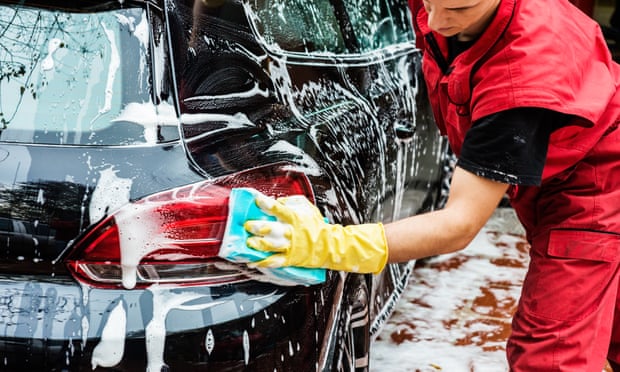People use Safe Car Wash app to report 930 suspected slavery cases in the period June to December last year
More than 900 drivers have reported potential cases of modern slavery involving workers at hand carwash services, using an app that makes it easy for people to sound the alarm if they have suspicions.
The Safe Car Wash app was launched last year. It gives users a checklist of questions to answer when visiting a hand carwash, including the price of the service (less than £6.70 is deemed suspicious), who takes the money, and whether the people washing cars look fearful. Depending on the answers, they may then be urged to make a report to the Modern Slavery helpline. The information collected by the app is shared anonymously with police and the Gangmasters & Labour Abuse Authority.
The app has been downloaded 8,225 times since it was launched by the Church of England and the Catholic Church. Between June and December last year, it was used more than 2,000 times. In 930 cases (41%), the user was told there was a high likelihood that individuals working at the hand carwash were subject to modern slavery and asked to call the helpline.
The results have been collated and analysed by the University of Nottingham’s Rights Lab. In nearly half of reports (48%), workers did not have access to suitable protective clothing such as gloves or boots, even though many hand carwashes typically require their workers to use potentially harmful chemicals such as hydrochloric acid.
In 80% of cases, the carwash had a cash-only policy. Nearly one in 10, or 8%, of reports logged that minors were working on site, and 17% of users identified fearful workers.
The app asked drivers to look out for nearby caravans, containers, mattresses and bedding as evidence of workers living on site – 14% of users reported they had seen that. However, only 126 drivers (18%) then used the app to call the modern slavery helpline, which the Church said was disappointing, although it is possible they may have made contact later.
Dr Akilah Jardine, research associate at the Rights Lab, said: “Investigations and operations on hand car-wash activities have identified the sector as a high-risk area for labour exploitation. Though often operating in plain sight, a great challenge in tackling abuses is the lack of data on the size and scope of the industry and the nature and prevalence of labour exploitation.”
Before 2004, hand carwashes were almost non-existent. Today, says the report, there are estimated to be 18,000, many of them run as legitimate businesses but some of them exploiting, forcing or threatening their workers. There have been reports of excessive working hours, the withholding of wages or pay below national minimum wage, and working without adequate protective safety gear and equipment.
The app, part of an anti-slavery project at the Church of England’s Clewer Initiative backed by the Catholic church’s Santa Marta Group, launched in October 2017 with the support of the prime minister and the Archbishop of Canterbury.
Bishop Alastair Redfern, chair of the Clewer Initiative, said the research showed that the app “has made an excellent start towards mapping the extent of modern slavery and labour exploitation in hand carwashes and, crucially, raising public awareness of this issue.
Advertisement
“Sadly, the findings so far confirm what we already feared – that many carwashes do not protect their workers.
“Our conversations with colleagues from law enforcement suggest that the data from the Safe Car Wash app is providing another piece in the puzzle of how to combat this complex crime. We hope to continue to build on this progress.”
In their foreword to the report, Redfern and Bishop Patrick Lynch, from the Santa Marta Group, said that in launching the app, “we were seeking to combat a phenomenon that Pope Francis calls the globalisation of indifference, where the laudable value of tolerance is twisted”.
They continue: “Instead of looking out for our neighbour, finding common ground, and exploring our differences, we ignore them. This indifference fuels modern slavery, because as a society we have chosen to ignore the most vulnerable.”

